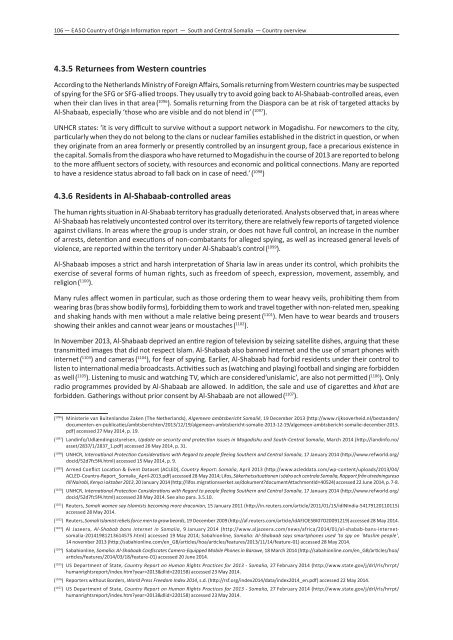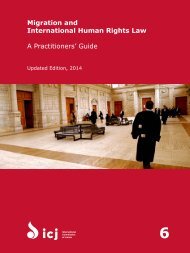You also want an ePaper? Increase the reach of your titles
YUMPU automatically turns print PDFs into web optimized ePapers that Google loves.
106 — EASO Country of Origin Information report — South and Central <strong>Somalia</strong> — Country overview<br />
4.3.5 Returnees from Western countries<br />
According to the Netherlands Ministry of Foreign Affairs, Somalis returning from Western countries may be suspected<br />
of spying for the SFG or SFG‐allied troops. They usually try to avoid going back to Al‐Shabaab‐controlled areas, even<br />
when their clan lives in that area ( 1096 ). Somalis returning from the Diaspora can be at risk of targeted attacks by<br />
Al‐Shabaab, especially ‘those who are visible and do not blend in’ ( 1097 ).<br />
UNHCR states: ‘it is very difficult to survive without a support network in Mogadishu. For newcomers to the city,<br />
particularly when they do not belong to the clans or nuclear families established in the district in question, or when<br />
they originate from an area formerly or presently controlled by an insurgent group, face a precarious existence in<br />
the capital. Somalis from the diaspora who have returned to Mogadishu in the course of 2013 are reported to belong<br />
to the more affluent sectors of society, with resources and economic and political connections. Many are reported<br />
to have a residence status abroad to fall back on in case of need.’ ( 1098 )<br />
4.3.6 Residents in Al‐Shabaab‐controlled areas<br />
The human rights situation in Al‐Shabaab territory has gradually deteriorated. Analysts observed that, in areas where<br />
Al‐Shabaab has relatively uncontested control over its territory, there are relatively few reports of targeted violence<br />
against civilians. In areas where the group is under strain, or does not have full control, an increase in the number<br />
of arrests, detention and executions of non‐combatants for alleged spying, as well as increased general levels of<br />
violence, are reported within the territory under Al‐Shabaab’s control ( 1099 ).<br />
Al‐Shabaab imposes a strict and harsh interpretation of Sharia law in areas under its control, which prohibits the<br />
exercise of several forms of human rights, such as freedom of speech, expression, movement, assembly, and<br />
religion ( 1100 ).<br />
Many rules affect women in particular, such as those ordering them to wear heavy veils, prohibiting them from<br />
wearing bras (bras show bodily forms), forbidding them to work and travel together with non‐related men, speaking<br />
and shaking hands with men without a male relative being present ( 1101 ). Men have to wear beards and trousers<br />
showing their ankles and cannot wear jeans or moustaches ( 1102 ).<br />
In November 2013, Al‐Shabaab deprived an entire region of television by seizing satellite dishes, arguing that these<br />
transmitted images that did not respect Islam. Al‐Shabaab also banned internet and the use of smart phones with<br />
internet ( 1103 ) and cameras ( 1104 ), for fear of spying. Earlier, Al‐Shabaab had forbid residents under their control to<br />
listen to international media broadcasts. Activities such as (watching and playing) football and singing are forbidden<br />
as well ( 1105 ). Listening to music and watching TV, which are considered‘unislamic’, are also not permitted ( 1106 ). Only<br />
radio programmes provided by Al‐Shabaab are allowed. In addition, the sale and use of cigarettes and khat are<br />
forbidden. Gatherings without prior consent by Al‐Shabaab are not allowed ( 1107 ).<br />
( 1096 ) Ministerie van Buitenlandse Zaken (The Netherlands), Algemeen ambtsbericht Somalië, 19 December 2013 (http://www.rijksoverheid.nl/bestanden/<br />
documenten‐en‐publicaties/ambtsberichten/2013/12/19/algemeen‐ambtsbericht‐somalie-2013-12-19/algemeen‐ambtsbericht‐somalie‐december-2013.<br />
pdf) accessed 27 May 2014, p. 19.<br />
( 1097 ) Landinfo/Udlændingsstyrelsen, Update on security and protection issues in Mogadishu and South‐Central <strong>Somalia</strong>, March 2014 (http://landinfo.no/<br />
asset/2837/1/2837_1.pdf) accessed 26 May 2014, p. 31.<br />
( 1098 ) UNHCR, International Protection Considerations with Regard to people fleeing Southern and Central <strong>Somalia</strong>, 17 January 2014 (http://www.refworld.org/<br />
docid/52d7fc5f4.html) accessed 15 May 2014, p. 9.<br />
( 1099 ) Armed Conflict Location & Event Dataset (ACLED), Country <strong>Report</strong>: <strong>Somalia</strong>, April 2013 (http://www.acleddata.com/wp‐content/uploads/2013/04/<br />
ACLED‐Country‐<strong>Report</strong>_<strong>Somalia</strong>_April-2013.pdf) accessed 28 May 2014; Lifos, Säkerhetssituationen i södra och centrala <strong>Somalia</strong>, Rapport från utredningsresa<br />
till Nairobi, Kenya i oktober 2013, 20 January 2014 (http://lifos.migrationsverket.se/dokumentdocumentAttachmentId=40524) accessed 22 June 2014, p. 7-8.<br />
( 1100 ) UNHCR, International Protection Considerations with Regard to people fleeing Southern and Central <strong>Somalia</strong>, 17 January 2014 (http://www.refworld.org/<br />
docid/52d7fc5f4.html) accessed 28 May 2014. See also para. 3.5.10.<br />
( 1101 ) Reuters, Somali women say Islamists becoming more draconian, 15 January 2011 (http://in.reuters.com/article/2011/01/15/idINIndia-54179120110115)<br />
accessed 28 May 2014.<br />
( 1102 ) Reuters, Somali Islamist rebels force men to grow beards, 19 December 2009 (http://af.reuters.com/article/idAFJOE5BI07O20091219) accessed 28 May 2014.<br />
( 1103 ) Al Jazeera, Al‐Shabab bans internet in <strong>Somalia</strong>, 9 January 2014 (http://www.aljazeera.com/news/africa/2014/01/al‐shabab‐bans‐ internetsomalia‐<br />
20141981213614575.html) accessed 19 May 2014; Sabahionline, <strong>Somalia</strong>: Al‐Shabaab says smartphones used ‘to spy on `Muslim people’,<br />
14 november 2013 (http://sabahionline.com/en_GB/articles/hoa/articles/features/2013/11/14/feature-01) accessed 28 May 2014.<br />
( 1104 ) Sabahionline, <strong>Somalia</strong>: Al‐Shabaab Confiscates Camera‐Equipped Mobile Phones in Barawe, 18 March 2014 (http://sabahionline.com/en_GB/articles/hoa/<br />
articles/features/2014/03/18/feature-01) accessed 20 June 2014.<br />
( 1105 ) US Department of State, Country <strong>Report</strong> on Human Rights Practices for 2013 - <strong>Somalia</strong>, 27 February 2014 (http://www.state.gov/j/drl/rls/hrrpt/<br />
humanrightsreport/index.htmyear=2013&dlid=220158) accessed 23 May 2014.<br />
( 1106 ) <strong>Report</strong>ers without Borders, World Press Freedom Index 2014, s.d. (http://rsf.org/index2014/data/index2014_en.pdf) accessed 22 May 2014.<br />
( 1107 ) US Department of State, Country <strong>Report</strong> on Human Rights Practices for 2013 - <strong>Somalia</strong>, 27 February 2014 (http://www.state.gov/j/drl/rls/hrrpt/<br />
humanrightsreport/index.htmyear=2013&dlid=220158) accessed 23 May 2014.



